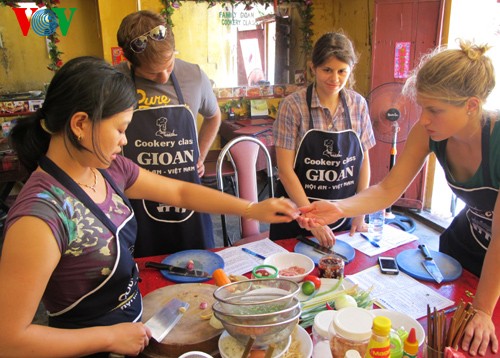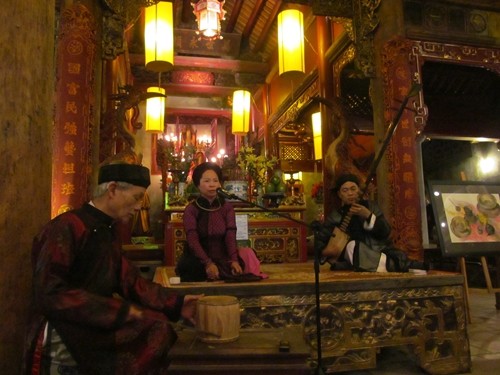Vietnam as a member of UNESCO World Heritage Committee
Phuong Thuy -
(VOVworld) – Vietnam became an official member of the UNESCO World Heritage Committee on November 20, 2013. The admission confirms Vietnam’s regional and global prestige in managing and preserving world heritage. It also requires Vietnam to work harder to consolidate its position.
 |
| American tourists learn how to cook Vietnamese noodle |
Vietnam now is able to vote for global cultural values and have more say in promoting its national culture. Vietnam will voice its views on UNESCO’s professional matters related to the recognition of world natural and cultural heritage. The country can also weigh in on the assessment of heritage preservation worldwide and help set guidelines and orientations for the Convention Concerning the Protection of the World Cultural and Natural World Heritage. Vietnam, who has a dozen of world recognized cultural heritage and thousands of national and local heritage, has realized the urgent need for preservation work, says Professor Ngo Duc Thinh, a member of the National Heritage Council: “Now we need to raise the awareness of the people and managers as a way to promote the role of culture in social development. In addition, their knowledge about heritage preservation should be enhanced”.
 |
| Ca Tru singing is recognized by UNESCO as intangible cultural heritage |
Researcher of culture Phan Cam Thuong underlines the importance of heritage preservation: “Whether Vietnam is a member of the World Heritage Committee or not, Vietnam needs to develop culture to make it a vital factor in social life. Culture covers how people behave with each other in daily life as well as the traditions based on which people move forward. These two elements should go together and be well preserved. Otherwise we will be materially rich but lacking morality”.
Vietnam’s membership in the UNESCO World Heritage Committee provides opportunities to learn from global experience and help conserve and promote humankind cultural values. Duong Van Quang, Ambassador and Head of the Vietnamese delegation to UNESCO, stresses the importance of training citizens in such areas as archaeology, history and science so that they can help make fair and effective assessments of other countries’ cultures. Quang believes that Vietnam with its thousands of years of history and a large number of world heritage will items be successful in its role as a member of the World Heritage Committee.
Phuong Thuy